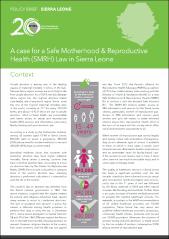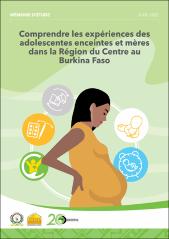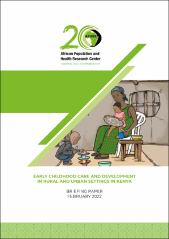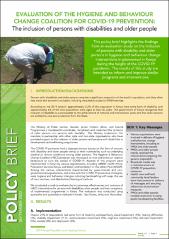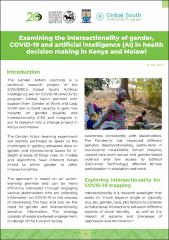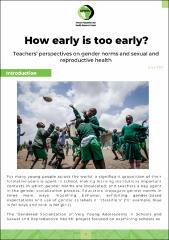Browsing Briefing Papers by Title
Now showing items 1-20 of 42
-
Abortion Incidence and Severity of Complications in Sierra Leone
(APHRC, 2022-10)In Sierra Leone, abortion is legally restricted, only allowed to save the lives of pregnant women, in case of rape or incest and, to preserve the physical and mental health of the woman. While the Sierra Leone government ... -
Abortion Incidence and Severity of Related-Complications in Liberia
(APHRC, 2023-04)Unsafe abortion is defined as a procedure for terminating a pregnancy that is performed by persons lacking the necessary skills or in an environment, not inconformity with the minimal medical standards or both. -
Assessing the Readiness of Healthcare Facilities to Provide Non-Communicable Disease Services in Kenya
(APHRC, 2022-12)Non-communicable diseases (NCDs) pose a major global health challenge in the 21st century, undermining socio-economic development around the world [1]. In low-resource settings, NCDs drain household resources due to ... -
A Case for a Safe Motherhood and Reproductive Health (SMRH) Law in Sierra Leone
(APHRC, 2023-02)Unsafe abortion is among one of the leading causes of maternal mortality in Africa. In the Sub- Saharan Africa region, women are most likely to die from unsafe abortion. As of 2019, the Sub-Saharan Africa region has ... -
The Case of Dakar and Ziguinchor: Similar yet Different (comparable education outcomes but distinctive SRHR indicators)
(APHRC, 2022-01)Dakar and Ziguinchor are two regions with similar geographic -both bordered by the Atlantic ocean- and cosmopolitan character/attributes. While Ziguinchor presents other advantages from its neighboring countries such ... -
Celebrating Reading Milestones: Graduating from a Zero Reader to a Confident Reader
(APHRC, 2025)Foundational learning is defined as "basic literacy, numeracy, and transferable skills such as socio-emotional skills." Recently, various global and national initiatives have been put in place to promote foundational ... -
Child Marriage an Appraisal of Zimbabwe’s Proposed Marriage Bill, 2019
(APHRC, 2022-10)Child marriage disproportionately affects girls, threatens their health and wellbeing, and also negatively impacts their education and life opportunities1. Given all the health and socio-economic risks of child marriage, ... -
Comprendre les expériences des adolescentes enceintes et mères dans la Région du Centre au Burkina Faso
(APHRC, 2022-06)COMME dans plusieurs pays de l’Afrique subsaharienne, le Burkina Faso a un taux de fécondité élevé chez les adolescentes, avec 132 naissances pour 1000 filles. Or, les grossesses précoces et non désirées peuvent avoir ... -
Contextual Drivers of Success in Education during the COVID-19 Pandemic: Evidence and Insights from Within and Across 7 Countries in Africa
(APHRC, 2023)Reflection is a valuable practice that allows intentional assessment and evaluation of situations and practices, while taking stock of lessons learned and identifying areas of improvement, individually or collectively. ... -
Dietary Transitions in Kenyan Cities: Leveraging Evidence for Intervention and Policy to Prevent Diet-related Non-Communicable Diseases
(APHRC, 2019-05)Kenya is experiencing a nutrition transition with some evidence of changes in dietary habits in urban areas. As a consequence, obesity and diet-related non-communicable diseases (DR-NCDs) are rapidly increasing and ... -
Early Childhood Care and Development In Rural and Urban Settings in Kenya
(APHRC, 2022-02)Informal childcare centers have sprung up to meet the growing demand for child care in urban informal settlements. This has resulted from the significant increase in the number of women engaging in paid employment outside ... -
Early Childhood Care and Development In Rural and Urban Settings in Kenya
(APHRC, 2022-02)The early years are critical for children's optimal health and developmental outcomes. However, too many children are spending their early years in suboptimal environments, with negative implications for their development ... -
Empowering Women Through Provision of Quality Childcare Services and Strengthening Their Capacities to Engage in Paid Labor Opportunities: Preliminary Findings from Nakuru County
(APHRC, 2023-02)Women spend disproportionately more time on unpaid work such as childcare and household chores than men. Childcare responsibilities and household chores seem to impede women’s participation in paid work. The quality ... -
Evaluation of the Hygiene and Behaviour Change Coalition for Covid-19 Prevention: The Inclusion of Persons with Disabilities and Older People
(APHRC, 2022-09)Persons with disabilities and older people comprise a significant proportion of the world’s population, and they often face social and economic exclusion; including inequitable access to WASH services. According to the ... -
Examination of LGBT People’s Lived Experiences and Public Perceptions of Sexual and Gender Minorities in Rwanda
(APHRC, 2022-05)This policy brief summarizes evidence from a study conducted in Rwanda by the Health Development Initiative (HDI) Rwanda and the African Population and Health Research Center (APHRC). The study’s aim was to understand ... -
Examining the Intersectionality of Gender, COVID-19 and Artificial Intelligence (AI) in Health Decision Making in Kenya and Malawi
(APHRC, 2022-06)The Gender Action Learning is a technical research project of the SIDA/IDRC’s Global South Artificial Intelligence (AI) for COVID-19 (AI4COVID) program. Global South partners with support from Gender at Work and ... -
Expériences de l’avortement au Bénin : déterminants sociaux et parcours de soins dans le département de l’Atlantique
(APHRC, 2022-01)Au Bénin, on estime que les décès liés aux avortements provoqués et non sécurisés causent entre 15 et 20% des décès maternels.1 Du fait de la restriction juridique et du stigma social autour l’avortement, de nombreuses ... -
Gender Mainstreaming Practices in Basic Education & Teacher Training In Kenya: Study Summary
(APHRC, 2025)The Government of Kenya, through the Ministry of Education, in line with Sustainable Development goals 4 and 5, is committed to providing quality education and attaining gender parity at all levels of education. To this ... -
How early is too early? Adolescents’ perspective on gender norms and sexual and reproductive health
(APHRC, 2020-07)Adolescent risky sexual behaviours and poor reproductive health outcomes have often been linked with gender norms, beliefs and practices that instigate inequalities between males and females. Inequitable gender norms are ... -
How early is too early? Teachers’ Perspectives on Gender Norms and Sexual and Reproductive Health
(APHRC, 2022-05)For many young people across the world a significant proportion of theirformative years is spent in school, making learning institutions importantcontexts in which gender norms are inculcated; and teachers a key agentin ...




